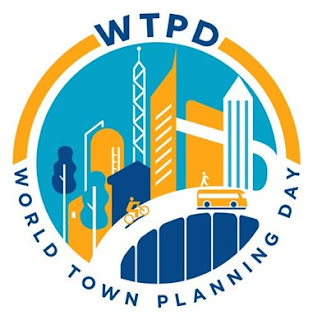Learn Globally, Apply Locally
“A good city planner does not sit in a room with maps, but goes out to the street and watches the way citizens want to interact with their public spaces. Design begins with a need. People first, then construction and then engineering.”- Mikael Colville-Anderson.
Can you imagine a world without adequate town planning? Indeed, such a world would be chaotic and riddled with anxiety and stress. Unfortunately, many of us live in such a world and therefore World Town Planning Day is merely academic. World Town Planning Day is observed annually on November 8. This day is set aside to commemorate the important role planning and urban structuring play in the creation of our communities. Such a world would be far removed from the United Nations Sustainable Development Goals, in particularly goal #11 that addresses the safety and resilience of cities and human settlements. Town planning is one of the most important parts of creating our organized and livable communities. The Day was founded in 1949 by the late professor Carlos Maria della Paolera. World Town Planning Day also goes by the name “World Urbanism Day.”
History of World Town Planning Day.
Urban or Town Planning is the most important process that goes into the development of any urban, suburban, or rural area. This process of urban planning determines that human beings work effortlessly, as well as live, and play in any given environment. Urban Planning is a concept that has been in existence for as long as the Mesopotamian and Egyptian civilizations and has positively evolved. In more technical terms, town planning refers to the technical processes that focus on the design, development, and use of infrastructure put in place when setting up a community. This planning focuses on factors like accessibility, transportation, communication, and distribution networks by applying knowledge from different areas of life such as engineering, architecture, politics, and even human psychology. The idea of a well designed and planned urban area can be traced to civilizations found in the third millennium B.C with Greek city-states centering on grid-like plans for military defenses and public convenience.
This year's theme is: Learn Globally, Apply Locally, and will focus on the value of learning from planning and planning cultures globally, fostering innovative, sustainable, and equitable solutions to address global challenges. World Town Planning Day is celebrated in 30 countries, including Jamaica on four continents each November. In Jamaica, the day is being observed under the theme, ‘Building Resilient Communities & Cities through Smart Solutions’. World Town Planning Day is a special day to recognize and promote the role of planners and planning in creating healthy, prosperous communities.
Urban planning emerged at the end of the 19th century to improve city life conditions by introducing zoning regulations, that is designating city areas for certain uses and specific functions. Planners also began to identify exclusive spaces for environmental conservation and decree local ordinances for heritage protection to prevent the destruction of the built historical heritage.
New Urban Approaches.
In recent decades there has been a renewed interest in traditional urbanism principles based on mixed-use development, walk able, well-connected neighborhoods, and built with a human scale. This movement is known as New Urbanism and impacts how cities are planned today. New Urbanism emphasizes the need to foster, through qualitative and tactical-experimental urban redesign, vibrant, socially integrated communities with healthy lifestyles. In more recent times, the concept of Landscape Urbanism has been gaining traction. This approach embodies the principles of New Urbanism but incorporates nature into the city’s development. It aims to create a more livable and sustainable environment, using green infrastructure to manage rainwater, improve air quality and create cooler microclimates to combat global warming.
The Way Forward.
The time to revisit urban planning is now. In many societies, zoning has been corrupted. As a result a tsunami of industrial and commercialization have been encroaching on residential communities for years. Sadly, many of the agencies tasked with responsibilities for urban planning have failed the citizenry. This failure has given birth to a number of citizen participatory groups that have become vocal in recent times in fighting back against the mayhem concerning unplanned development that now characterizes many societies. In quite a number of instances, the elderly, children and women continue to face the fury of improper urban planning. We tend to forget at times that one’s health suffers as a result of unacceptable urban planning. The quality of the air is often negatively impacted resulting in an uptick in respiratory and non-communicable diseases such as asthma and hypertension for many residents. Obviously, there needs to be a national sense of urgency involving citizens’ associations so as to regain control of the mechanisms responsible for urban planning and sustainable development. It cannot be business as usual. We all have a stake in ensuring that proper town planning becomes normative.
In the words of Aldo Rossi, one cannot make architecture without studying the condition of life in the city.
Wayne Campbell is an educator and social commentator with an interest in development policies as they affect culture and or gender issues.
waykam@yahoo.com
@WayneCamo
©
#WorldTownPlanningDay #WorldUrbanismDay.




Comments
Post a Comment